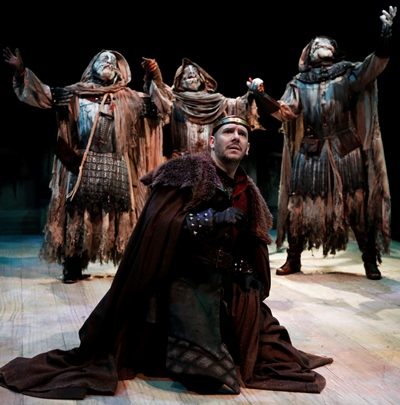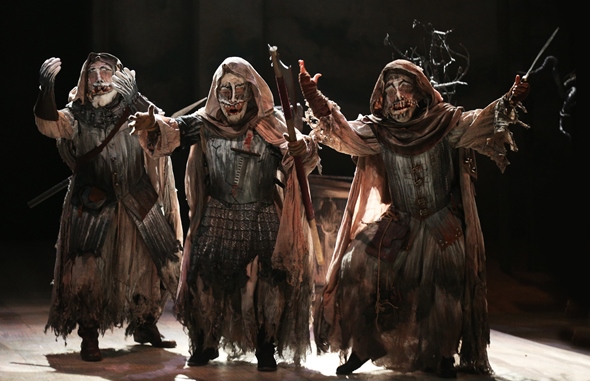Chicago Shakes’ ‘Macbeth’ for young adults explores the dangers of unchecked ambition
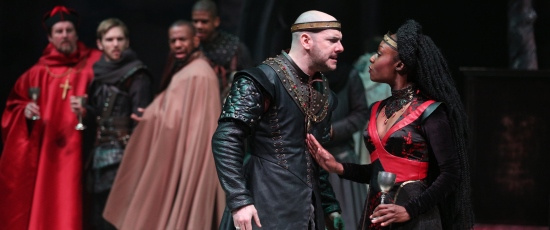 Preview: Iconic tale of an honorable man’s impulsive and bloody grab for the Scottish throne is retold in a brisk 75-minute reduction aimed at Chicago students. “Macbeth” opens Jan. 24 at CST.
Preview: Iconic tale of an honorable man’s impulsive and bloody grab for the Scottish throne is retold in a brisk 75-minute reduction aimed at Chicago students. “Macbeth” opens Jan. 24 at CST.
By Lawrence B. Johnson
Shakespeare’s “Macbeth” is a tale told by an idiot full of…no, wait a sec. That’s not right. The idiotic tale is life – life itself, which Shakespeare’s reckless, overreaching, murderous Macbeth has messed up beyond redemption.
Such is the iconic story of bloody ambition and tenuous power that Chicago Shakespeare Theater will distill into a succinct “Macbeth” for Chicago area junior high and high school students – the latest in a well-conditioned series that CST calls “Short Shakespeare.” Although many school groups attend these productions, tickets also are offered for sale to the general public.
“The main challenge in presenting ‘Macbeth’ to a young audience is helping them to connect to its themes of ambition and power, and what your mind can do to you when you have committed an evil act,” says Kirsten Kelly, who prepared Chicago Shakespeare’s 75-minute “Macbeth” and will direct the show that some 30,000 Chicago youngsters are expected to see in performances at CST or at their own schools when the production tours the area.
“To make Macbeth’s journey personal, you have to focus on the consequences of his actions.”
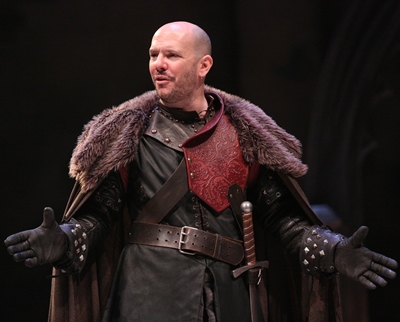 In the aftermath of a battle, Macbeth and his good friend Banquo encounter three “weird sisters” – witches, if you like – who address Macbeth by his title as thane (sort of like an earl) of Glamis. But the next thing Macbeth knows, these hags are saluting him as the future king.
In the aftermath of a battle, Macbeth and his good friend Banquo encounter three “weird sisters” – witches, if you like – who address Macbeth by his title as thane (sort of like an earl) of Glamis. But the next thing Macbeth knows, these hags are saluting him as the future king.
All this, Macbeth (played by Chris Genebach) puts into a letter to his wife. If he is merely amazed, Lady Macbeth (Lanise Antoine Shelley) begins instantly to hatch a bloody plot. From the moment Macbeth walks in the door, she’s on his case to kill the king, who will spend the night with them, and claim the prize that fate obviously has in store for him.
The ancient Greeks had a word for the arrogant, willful, presumptuous behavior that Macbeth displays. They called it hubris, and to the observing gods it was at the top of the list of moral failures. In Greek story-telling, hubris typically met with severe punishment from divine hands. Macbeth likewise get his comeuppance. Yet in this, Shakespeare’s so-called Scottish play, it is the bizarre circumstance of Macbeth’s encounter with the weird sisters that beckons an honorable, brave and indeed contented man toward the mad choices that will send his life into a fatal plunge.
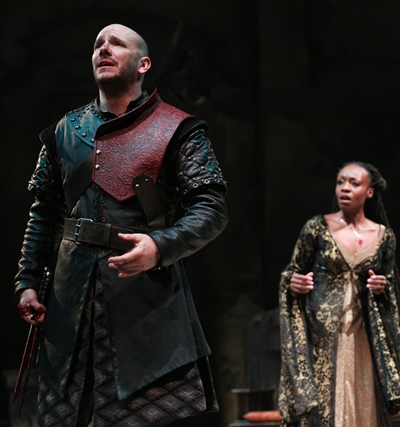 To the surprise of these usurpers, seizing the throne doesn’t stop the blood bath. It rages on until Lady Macbeth, overwhelmed by its rising tide, breaks under the sheer weight of guilt, and Macbeth discovers too late how the weird sisters have played him for a gullible fool.
To the surprise of these usurpers, seizing the throne doesn’t stop the blood bath. It rages on until Lady Macbeth, overwhelmed by its rising tide, breaks under the sheer weight of guilt, and Macbeth discovers too late how the weird sisters have played him for a gullible fool.
“When Macbeth and Lady Macbeth decide to murder Duncan, they reject their code of honor,” says Kelly. “There can never be peace in their souls again. There is fallout from an evil act, a sense of guilt that seeps into your whole being. An internal unraveling begins.
“Macbeth must bear responsibility for his own actions. The weird sisters aren’t pushing him. All they do is hold out the carrot in the presence of a witness (Banquo). The rest Macbeth does to himself.”
Related Link:
- Performance location, dates and times: Details at ChicagoShakes.com
- Preview of Chicago Shakespeare Theater’s complete 2014-15 season: Read it at ChicagoOntheAisle.com
Tags: Chicago Shakespeare Theater, Chris Genebach, Kirsten Kelly, Lanise Antoine Shelley, Macbeth, Shakespeare

